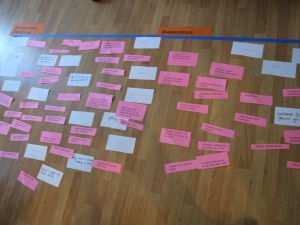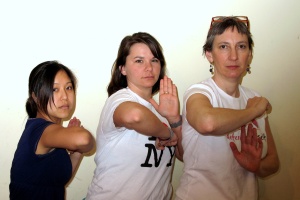When we’re harassed in public spaces, or in other settings for that matter, how can we respond? Lauren Taylor, a self defense instructor and long time women’s rights activist, helped attendees of yesterday’s Defend Yourself street harassment-focused self defense workshop learn some basic tactics.
While street harassment is not just women’s responsibilities to end when men are the harassers, and indeed we will have an impossible time ending it without the cooperation and support of men, learning tactics so we can stand up for and defend ourselves when we are harassed can be incredibly powerful. We have the right to be safe in public and use public spaces as often as we want. While most of us may not ever be in a life threatening situation or face physical harassment, just knowing we could defend ourselves if necessary can give us more confidence to go about our daily lives without letting the behavior, actions, or comments of others dictate how we live.
 After an opening discussion about who we (attendees) were and the impact street harassment has on our lives, Lauren engaged us in a group activity. On slips of paper, we wrote types of harassing behavior, from honking to physical assault. Then we placed the pieces of paper on a spectrum, from annoying to life threatening, depending on what we thought about the severity of the action. Lauren led a discussion about the placement of the pieces of paper and helped attendees see street harassing in the context of men’s violence against women and workplace and school-based sexual harassment. The strategies she taught us can be modified to fit all these situations.
After an opening discussion about who we (attendees) were and the impact street harassment has on our lives, Lauren engaged us in a group activity. On slips of paper, we wrote types of harassing behavior, from honking to physical assault. Then we placed the pieces of paper on a spectrum, from annoying to life threatening, depending on what we thought about the severity of the action. Lauren led a discussion about the placement of the pieces of paper and helped attendees see street harassing in the context of men’s violence against women and workplace and school-based sexual harassment. The strategies she taught us can be modified to fit all these situations.
Lauren emphasized that any situation can escalate to violence and we must always think about what response will make us feel and be the safest. That may be ignoring or walking away from the harasser, which is fine, as long as that is our choice. If we do it because we don’t know what else we can do, that is not an empowering decision. The point of the workshop was to learn about other options.
Since most harassment women face is verbal, Lauren focused on verbal tactics. We practiced assertive responses to mock harassers and getting comfortable with speaking up. Practicing saying “no” in an assertive tone of voice, with a confident, strong stance was the base line. In a society where women in general (and many of us in the class said we had) have been socialized to be polite, try not to cause a scene, and look out for the feelings of others over our own, the simple act of saying “no” was both difficult and empowering.
Similar to suggestions from Martha Langelan in her book Back Off!, Lauren has a list of tactics for basic verbal self defense. Telling the harasser what you want is key. “Stop it!” “I don’t like that,” “leave me alone,” and “stop touching me” are all examples of direct responses you can say to a harasser. We practiced these phrases while exuding strong body language, tone of voice, and facial expression. We also role played different harassment scenarios, taking turns playing a harasser and harassee and responding on the fly to the harassment we received. Role playing was challenging, but useful in seeing how it feels to stand up for oneself and hold one’s ground when confronted by not only a harasser, but a persistent harasser.
We also tried out a few simple physical self defense moves for the times when the harassment escalates. These moves included pushing the palm of our hand to the nose or chin or a harasser, our elbow to their throat, stomping on their feet, and elbowing someone standing behind us. We practiced yelling, “No!” at the same time to not only emphasize our feelings, but because, in a real situation, yelling could attract the help of bystanders.
The workshop closed with attendees sharing ideas for ending street harassment. Sharing our street harassment stories and informing the boys and men in our lives about the extent of this problem were the most frequently suggested ideas. You can share you stories by submitting them to stopstreetharassmentATyahooDOTcom and they’ll post on this blog. Here are other suggested strategies.
I want to continue practicing role playing, standing up for myself, and having an assertive response to harassers because my inclination is to freeze, try to get away, or try to appease and humor the harasser until they stop. None of those reactions is empowering. While in some instances those behaviors may be necessary for safety or convenience sake, I’d also like to easily have an assertive response.
In sum, this class was wonderful and I highly recommend it.
Has anyone else taken a self defense class? Has it helped you deal with street harassers? Has it made you feel more confident?

